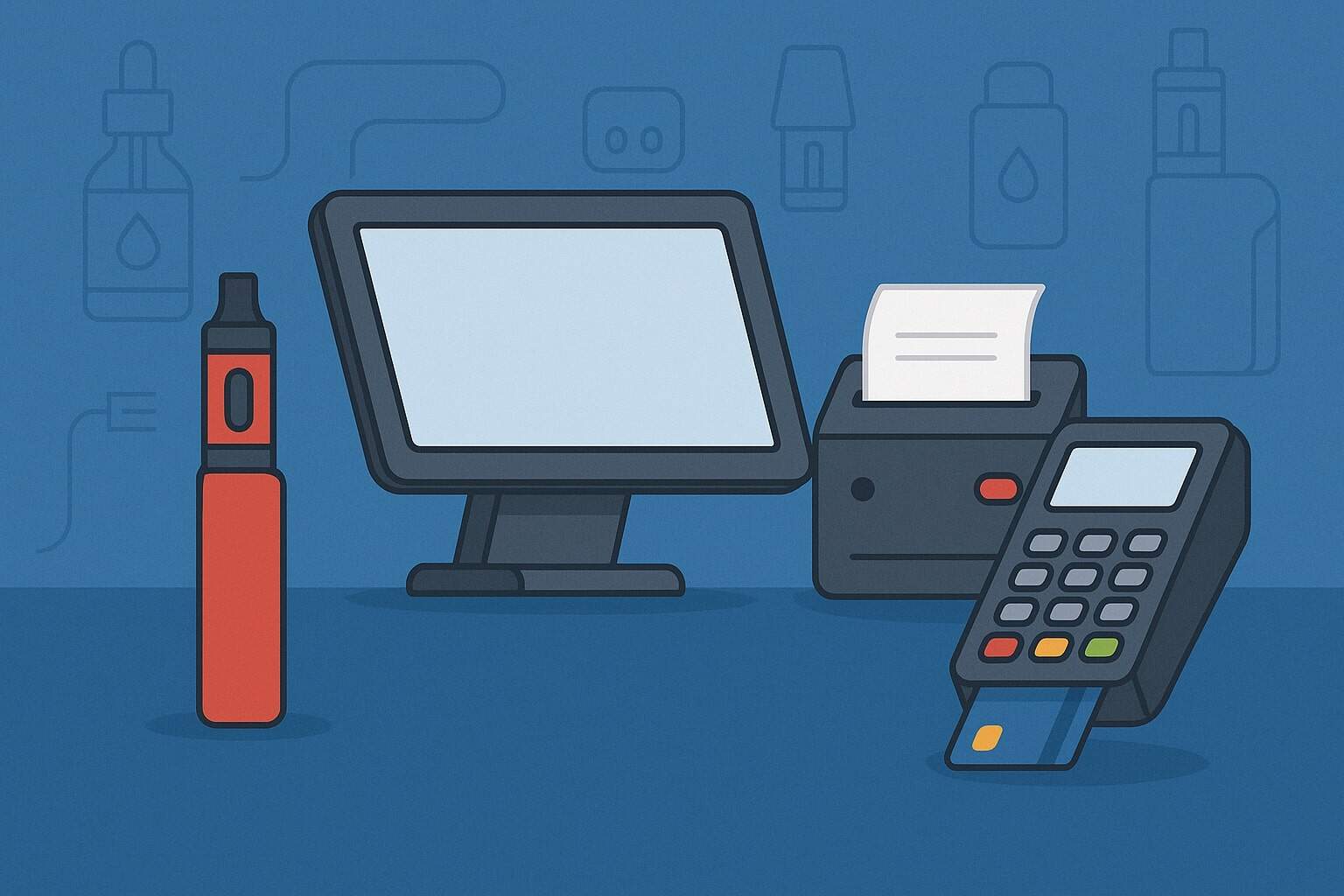
By vapeshoppointofsale September 13, 2025
A vape shop POS (Point of Sale) system is the digital checkout and management platform tailored for stores selling vaping and tobacco products. It combines a cash register with software to process sales, track inventory, and enforce legal compliance.
For vape retailers, the right POS goes beyond just ringing up sales – it handles age verification, specialized inventory, high-risk payment processing, and more. In today’s market, a robust POS is as vital as the cash register itself, serving as the nerve center of the business.
Operating a vape shop comes with unique challenges. Owners must manage hundreds of SKUs (different e-liquid flavors, devices, coils, etc.) while complying with strict regulations. For example, U.S. law now bans sales of any tobacco or e-cigarette products to anyone under 21 (federal “Tobacco 21” law).
Recent FDA rules even require scanning a photo ID for customers under 30 at purchase. A specialized POS helps ensure every sale meets these age rules, automatically prompting for ID checks and logging verifications.
Additionally, banks consider vape shops “high-risk” merchants, so a POS must work seamlessly with high-risk payment processors to avoid issues like account freezes.
Beyond compliance, vape shops need advanced inventory management. Products are perishable (e-liquids typically expire after 1–2 years) and come in many variants (flavors, nicotine levels, device models).
A modern vape POS tracks expiration dates, batch numbers, and milliliter-based taxes, automatically adjusting prices and tax rates as needed. By scanning barcodes at checkout, the system deducts each item from stock, ensures the correct price and tax are charged, and prevents overselling. This automation saves time on manual counts and reduces errors.
Why Vape Shops Need Specialized POS
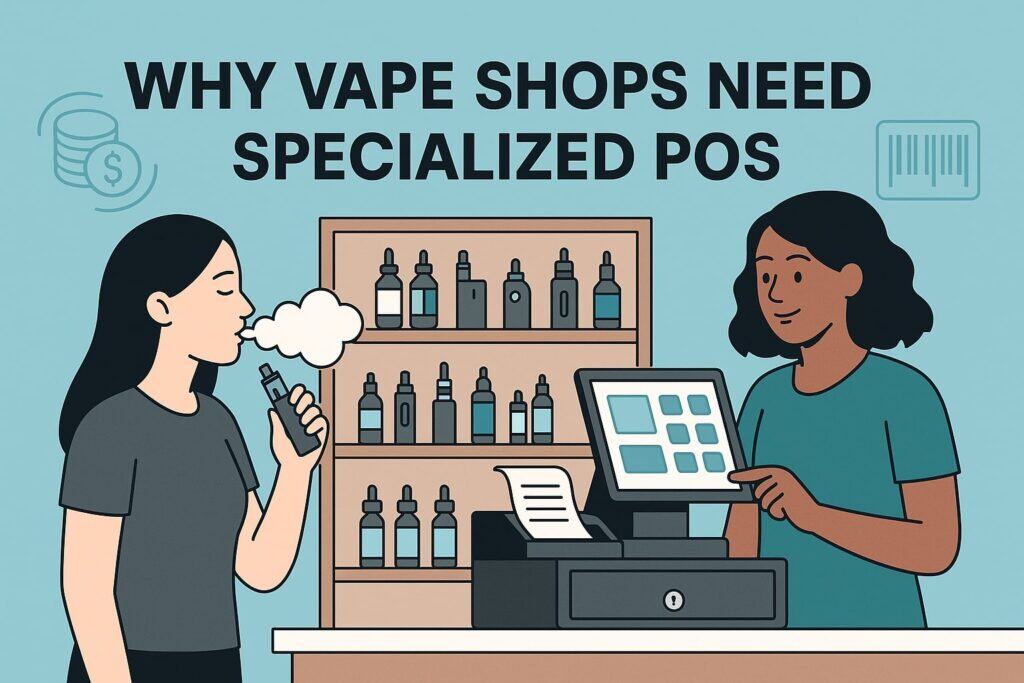
- Legal Compliance: Vape shops must follow federal and state tobacco laws. The federal Tobacco 21 law (effective Dec. 2019) raised the minimum age to 21 for all tobacco and vaping product sales.
In 2024 FDA rules began enforcing photo-ID checks for anyone under 30. A dedicated POS can automatically enforce age checks (e.g. by prompting for ID on age-restricted items) and log each check for compliance records.
Some states (e.g. California, NY, Oregon) even require digital proof of age verification at the register. Without a proper POS, shops risk fines or losing licenses for accidental underage sales. - High-Risk Payments: Because vape products are tobacco/nicotine-related, banks often impose extra fees or even refuse service. A vape-specific POS works with high-risk payment processors, or integrates its own merchant services, to keep payments flowing smoothly.
Advanced features like dual pricing (offering cash discounts vs card fees) and transparent surcharges can reduce credit card costs. These systems often include fraud/risk tools to keep chargebacks low. - Product Complexity: Vape shops carry a broad range: from disposable vapes to refill bottles, mods, coils, and accessories. Tracking this inventory manually is error-prone.
A vape POS can handle kit and bundle items (e.g. mod + tank + coil sold as a package), track flavors and nicotine strengths, and manage lots and expirations. It alerts when stock is low and can automate reorder rules. This ensures best-sellers stay on shelf while dead stock is minimized. - Omnichannel Sales: Many vape shops sell both in-store and online. A unified POS syncs brick-and-mortar and ecommerce platforms, keeping inventory consistent everywhere.
Orders placed on a website update in-store stock in real-time, and vice versa. It also manages fulfillments (in-store pickup, delivery, shipping) with tracking notifications, helping shops scale without overselling or compliance gaps. - Customer Engagement: Modern consumers value loyalty programs and personalized offers. A vape POS usually includes CRM tools and loyalty features. It records customers’ purchase history and preferences, enabling targeted promotions (e.g. offering discounts on favorite flavors).
Some systems even support opt-in loyalty (email or receipt-based punch cards) without violating marketing laws. This drives repeat visits in a competitive market. - Growth & Multi-Store Management: As a vape brand grows, managing multiple locations becomes complex.
A cloud-based POS lets owners oversee all stores from one dashboard, transfer stock between branches, and standardize settings. Real-time reports across stores show which locations and products are most profitable, so decisions are data-driven.
In summary, vape shops operate under tight regulations and high competition. An ordinary retail POS often lacks these capabilities. Industry experts emphasize that a vape-specific POS – one built for age-verification, compliance and complex inventory – is essential.
For example, CigarsPOS notes that without a high-risk POS, a shop “could end up in deep water – possibly even lose [its] license”. Likewise, merchant advisors highlight that missing just one ID scan or tax step can mean “thousands in fines”.
Key Features of a Vape Shop POS System
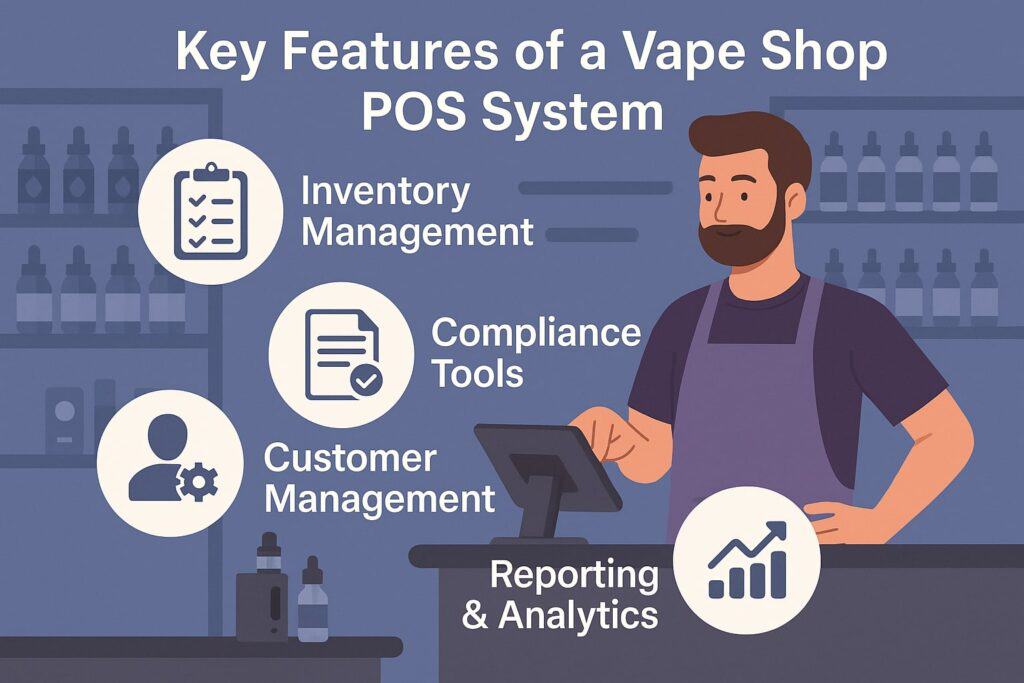
Below are the core features every vape retailer should look for in a POS:
- Age Verification & Compliance Tools: Modern vape POS systems auto-prompt for ID when an age-restricted item is rung up, and scan/validate driver’s licenses or state IDs at checkout.
They timestamp and log each check to build a compliance record. Some even maintain a “do-not-sell” list of underage customers. With the FDA now requiring ID checks for all customers under 30, having built-in ID scanners or age-gate software is no longer optional.
Additionally, these systems can enforce location-specific rules (e.g. blocking flavored vapes where banned) and produce tax reports pre-configured for vape products. - Advanced Inventory Management: A robust vape POS handles vast product catalogs. It can track inventory by flavor, brand, nicotine strength, and bundle components (e.g. device kits) in real time.
When a sale is made, stock levels update immediately across channels. Smart features include automatic reordering (triggering purchase orders when items run low), batch/lot management for regulated ingredients, and expiration date tracking for e-liquids.
Because e-liquid taxes in many states are based on volume (milliliters), a vape POS often automates per-mL tax calculations to ensure accurate pricing. - Barcode Scanning & Fast Checkout: Speed and accuracy at the register are crucial. Using a barcode scanner, a POS instantly retrieves the product, price, and correct tax rate. This minimizes manual entry errors and keeps lines moving.
For example, scanning a disposable vape ensures the system charges the right price (including any variable taxes) and deducts the item from inventory simultaneously. Many vape-specific POS systems come with handheld scanners or mobile apps to scan on-the-go (useful for stocktakes or curbside pickup). - Payment Processing for High-Risk Retail: Since banks view vape shops as high-risk, a good POS offers approved payment solutions. This may mean having an in-house merchant account designed for age-restricted retail, or the ability to easily integrate with external high-risk processors.
Some systems support dual pricing – offering a small discount for cash to offset credit card fees – which is legal in many states.
They also clearly display surcharges and keep detailed payment records, helping you stay under chargeback thresholds. In short, look for a POS that specializes in vape/CBD merchant services. - E-commerce and Omnichannel Integration: If you sell online, your POS should seamlessly connect to your website. The best systems sync products, prices, and inventory with e-commerce platforms so updates happen automatically.
This means an online order reduces in-store stock, and in-store sales adjust your web catalog. Features like click-and-collect, curbside pickup, and shipping with tracking can be built in.
Notably, the POS must enforce age verification online too (age-gates on restricted products) to stay compliant across channels. - Customer Loyalty and Marketing: Look for a POS with built-in loyalty/CRM tools. It should collect customer data (with consent) during checkout, enabling personalized marketing.
Examples: automatically email coupons to frequent buyers, issue reward points for each purchase, or prompt first-time customers with welcome offers.
Because vape shops cannot use SMS marketing (due to advertising rules), some POS platforms use receipt-based digital loyalty or opt-in email campaigns. These tools help retain customers without violating regulations. - Reporting & Analytics: A good vape POS generates insightful reports for informed decisions. Essential reports include sales by product category, best-selling flavors, peak shopping times, and inventory turnover rates.
Compliance reports (e.g. age-verification logs or tax remittance reports) are also important. These analytics reveal trends – for instance, which new vape device is taking off or when to restock top e-liquids.
Many systems offer customizable dashboards and can export data to accounting software for financial reporting. - Multi-Store & Cloud Management: For businesses with more than one location, the POS should be cloud-based. This allows centralized control: adjust pricing and promotions chain-wide, transfer stock between stores, and view consolidated sales data in real time.
Cloud systems also ensure you’re always running the latest compliant software (updates are automatic). Even a single-store owner benefits: store data is backed up off-site, and you can manage the store from any device (tablet, phone, or computer) when away. - Security & User Permissions: Vape shops handle sensitive data (IDs, payments). A secure POS encrypts customer and payment data to stay PCI-compliant. It also lets you set user roles – for example, limiting cash drawer access or void/sale cancellation rights.
Staff logins and audit trails help detect fraud or errors. While these are basic for any POS, they’re crucial in an environment with high cash use and regulated products.
Benefits of a Vape Shop POS
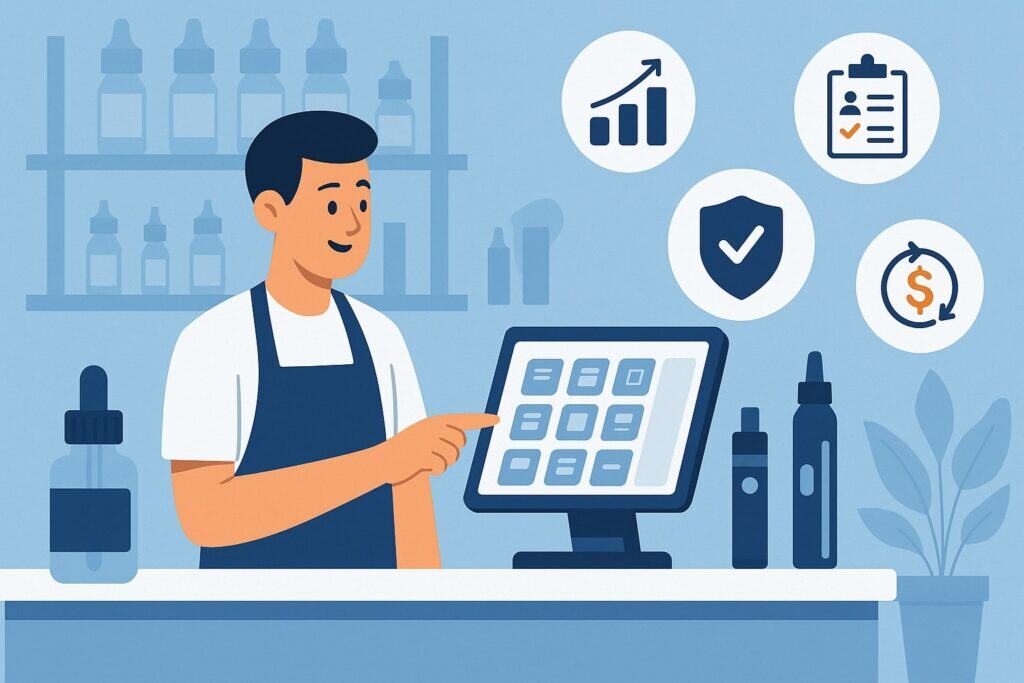
Implementing a specialized POS system brings concrete benefits for vape shop owners and staff. For starters, it simplifies compliance, dramatically reducing the risk of underage sales by automating checks.
It eliminates manual inventory errors, ensuring you know exactly what’s in stock (and what’s not) at any moment. Checkout becomes faster and more reliable with barcode scanning and integrated payment processing, improving customer satisfaction.
A quality POS also boosts efficiency and insights. Owners can generate key reports with a click, rather than sifting through paper logs. This means you can quickly see which flavors or devices are trending, or if a state tax on e-liquids is cutting into profits.
Loyalty and marketing features drive repeat business: by understanding purchase patterns, shop managers can send targeted offers and build stronger customer relationships.
Perhaps most importantly, a vape-ready POS can grow with your business. Whether you’re a single-store startup or a regional chain, these systems scale by adding registers or new modules (e-commerce, accounting integration, payroll, etc.) as needed.
Many providers support multi-location rollouts with minimal extra setup, so expanding your footprint doesn’t require completely new processes.
Overall, the right POS frees you from tedious tasks so you can focus on customers and growth. Staff spend less time on paperwork and more on service. Customers benefit from smooth, modern checkout experiences. And you gain peace of mind knowing your shop is leveraging technology to stay compliant, organized, and competitive.
Popular Vape Shop POS Systems (USA)
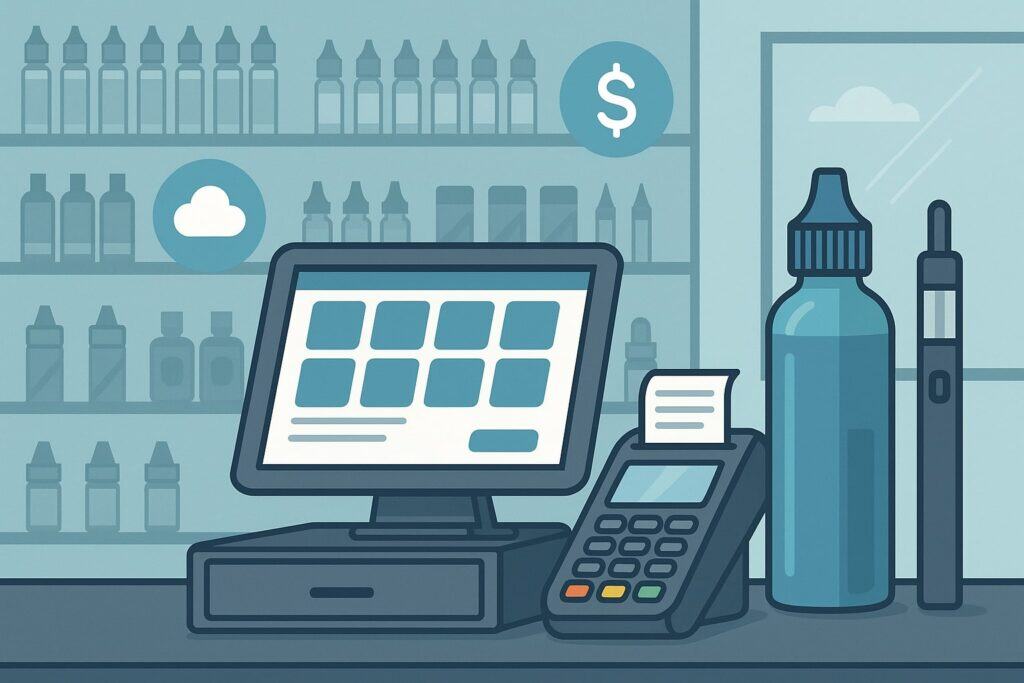
Several POS providers serve the U.S. vape market. Below are real-world examples of systems used by vape and smoke shops, along with their key highlights (features and pricing are illustrative):
- FTx POS (FasTrax POS): A system built specifically for age-restricted retailers. It emphasizes age verification with integrated ID scanning and online age checks, plus high-risk payment processing tailored for vape shops.
FTx offers full inventory management (auto reordering, vendor mgmt) and multi-store support. Plans start around $89/month for basic features. (Fastrax also bundles hardware discounts with its payment service.) - Lightspeed Retail: A versatile retail POS with strong inventory and ecommerce features. Lightspeed includes online store integration (SEO tools, website builder) and detailed customer profiles for loyalty programs.
Its base plan ($89+/mo) covers inventory and payments; the $149/month plan adds fully integrated ecommerce. It requires using Lightspeed’s payment processing (starting ~2.6% +$0.10). In vape shops, Lightspeed can handle multi-location scale, but note that advanced features (and compliance apps) may come at higher tiers. - Clover POS: A hardware-centric solution popular with small retailers. Clover’s register is user-friendly and supports a marketplace of apps. Vape shops can add age-verification apps and specialized inventory apps (e.g. for tracking coil types) through the Clover App Market.
Pricing: devices start ~$60/month (with a 36-month payment plan), plus payment fees (around 2.6% + 10¢). Clover’s strength is ease of setup; its drawback is that more complex inventory or loyalty programs often require third-party apps. Its native inventory is basic, so very large shops may outgrow it. - Shopify POS: Best for shops that are already selling online or want a unified platform. Shopify POS connects seamlessly to Shopify’s ecommerce. It supports basic age-verification at checkout (with options for additional compliance apps).
Key advantages: consistent inventory/CRM across web and store, and familiarity if you use Shopify. Plans start at ~$89/mo (for proprietors). Shopify charges extra (2% fee) if you use non-Shopify payment gateways.
This system is ideal for startups or stores with strong online focus. However, its native high-risk payment support is limited, so verify with your processor before choosing. - Square for Retail: A cost-friendly POS with a free tier and simple interface. Square’s free plan covers basic inventory (tracking stock and variations) and checkout, with offline sales capability if you lose internet.
Paid Retail plan ($89/mo) adds more features like advanced reporting. Square’s payment processing is built-in (with standard fees ~2.6%), but the platform is not ideal for high-risk products; it offers only basic age-gating.
Still, many small vape shops start with Square due to no monthly fee and easy setup. As one grows, they may upgrade to a more specialized system. - Korona POS: A veteran in tobacco/vape retail. Korona offers built-in ID scanning for age verification at checkout. It has robust inventory tools (mass editing, auto reorder, custom pricing).
Korona itself does not process payments, but integrates with major providers (including high-risk ones). The system is cloud-based and scales from single to multi-store.
(Some users report it has a learning curve.) Pricing is tiered; plans typically start around $50–$100/month. - ConnectPOS: Designed specifically for smoke and vape shops. It offers built-in age verification, supports high-risk payment processing, and can track regulated items by batch.
ConnectPOS emphasizes multi-location visibility: owners see inventory by flavor/nicotine level across all stores. It also fully integrates online sales with strict age-gating. This system excels at compliance and multi-channel control. (Pricing varies by configuration.) - POS Nation: A turnkey solution for tobacco retailers. POS Nation combines hardware and software with full support. It automatically manages inventory counts, generates detailed sales reports, and runs loyalty programs.
It’s known for easy implementation and 24/7 support. POS Nation plans are typically bundled with hardware; costs depend on hardware choices and service level. - Epos Now: A simple cloud POS that connects brick-and-mortar and online sales. It syncs web orders and physical stock in real-time. Shop owners report spending “less time on administrative tasks” using Epos Now.
It includes age checks during checkout to ensure compliance. Pricing starts with a free basic plan (mobile POS app + limited features), and paid plans (~$39–$79+/mo) add full retail functionality.
Table: Comparison of Selected Vape Shop POS Systems
| POS System | Age Verification | Inventory Management | High-Risk Payments | E-commerce | Starting Price |
|---|---|---|---|---|---|
| FTx POS | Built-in ID scan | Advanced (reordering, SKUs) | Integrated for high-risk | Yes (add-on) | ~$89/mo |
| Lightspeed | Add-on (e.g. Hyperspace) | Full (variants, SEO) | Integrated (2.6%+10¢) | Yes (included) | $89–$149/mo |
| Clover | Via 3rd-party apps | Basic; apps for specialty | Flexible via partners | Limited (via Shopify, etc.) | $60+/mo (3-yr plan) |
| Shopify POS | Basic built-in; apps for strict | Good (syncs online catalog) | Integrated (2% fee if using other processors) | Yes (with Shopify site) | $89+/mo |
| Square Retail | Basic (manual) | Good (stock, variations) | Built-in (not high-risk ideal) | Yes (with Square online) | Free basic; $89/mo pro |
| Korona POS | Built-in ID scanning | Advanced (auto-order, editing) | Integrates top processors | Yes (3rd-party modules) | $50–$100/mo (est.) |
| ConnectPOS | Built-in age gate | Advanced (batch tracking) | Supports high-risk natively | Yes (ecom sync) | Custom pricing |
| POS Nation | Often via add-ons | Full (loyalty, P.O.s) | Yes (integrated) | Yes (with Shopify, etc.) | ~$75+/mo + hardware |
| Epos Now | Built-in (age checks) | Good (real-time sync) | Integrated (Square, etc.) | Yes (built-in) | Free basic; $39+/mo |
How to Choose the Right POS for Your Vape Shop
Selecting a POS should start with a clear list of your business needs. Consider these steps:
- Assess Your Store Size & Budget: Small single shops might prioritize cost and ease-of-use, while multi-location businesses need scalability.
For a one-store vape shop, focus on systems with low monthly fees and intuitive setup. Larger or multi-store chains may invest more to get real-time data across locations. - Inventory Needs: If you sell dozens of e-liquid flavors and devices, prioritize a POS with robust variant tracking and low-stock alerts. Look for features like bundle/kit support (for combo deals) and the ability to categorize products by nicotine strength or flavor.
- Compliance Requirements: Make sure the POS has or supports age-verification tools. Does it prompt for ID on every vape sale? Can it scan driver’s licenses and record DOBs automatically? Verify if it keeps audit logs and can generate compliance reports. Given federal and state rules, this is non-negotiable.
- Payment Processing: Confirm the POS works with a high-risk payment processor. Some systems force you into their payment plan, so check if their terms and rates are acceptable. It’s wise to get a rate quote and ensure they won’t shut you down for selling vape products.
- E-commerce Integration: If you sell online (or plan to), the POS should either include ecommerce or easily connect with major platforms (Shopify, WooCommerce, etc.). A live sync of stock and sales channels prevents overselling and keeps customer accounts unified.
- Ease of Use & Support: Vape shops often have high staff turnover, so a clear, user-friendly interface is a plus. Look for vendors known for responsive customer support (24/7 help can be critical).
Some providers specialize in vape/tobacco retail and understand industry jargon, which can smooth training. - Growth and Extras: Consider future needs. Do you want built-in loyalty programs, marketing emails, or advanced analytics later?
Check if those features are available (even if as paid add-ons) so you can scale up without switching systems. Some POS can also integrate with accounting software (e.g. QuickBooks) or POS peripherals (like scanners and scales).
Taking advantage of free trials or demos is wise. Almost all POS providers offer a test period. Use it to simulate actual sales: ring up a few vape mods, scan an age-restricted item (see if it flags ID), and generate a report. This hands-on trial helps ensure the system truly fits your workflow.
FAQ
Q: What features should the best vape shop POS system have?
A: Essential features include age verification (ID scanning with timestamp logging), compliance tracking for vaping regulations, comprehensive inventory management (with flavor/strength variants, expiration dates, batch numbers), and detailed reporting. Bonus features are loyalty/CRM tools and ecommerce integration.
Q: How does a POS system help me comply with age laws?
A: Modern vape POS systems can be set to automatically prompt for ID on age-restricted items. They use scanners or built-in camera ID readers to verify birthdates, then record and log each check.
This ensures you only sell to legal-age customers. They can also enforce any state-specific rules (like no sales of flavored e-liquids where banned) and generate audit reports if regulators ask.
Q: Can these POS systems handle both retail and online vape sales?
A: Yes, many vape-specific POS solutions offer omnichannel support. They sync your in-store inventory with online stores (Shopify, Magento, etc.) in real-time. This means if an e-liquid sells out online, it’ll show as out of stock in-store (and vice versa).
Some systems even offer built-in ecommerce platforms or apps to manage all sales channels from one dashboard.
Q: What is the typical cost of a vape shop POS?
A: Costs vary by features and provider. Generally you pay a monthly software subscription (often $50–$150+) plus hardware (terminal, scanner, receipt printer, etc.). For example, FTx POS plans start around $89/month for a single store.
Square’s basic retail POS is free (with fees on card transactions), while Lightspeed starts at $89/month (ecommerce add-on at $149). Expect to budget for both software and any needed hardware.
Q: Do vape shop POS systems integrate with my other business tools?
A: Yes. Leading vape POS platforms support integrations. They can sync with accounting software (like QuickBooks), email marketing tools, payroll apps, and ecommerce platforms.
This unified approach means sales data automatically flows to your financials, and customer information can fuel targeted marketing. Integrations reduce double-entry work and help automate tasks like tax filing or reordering.
Q: What if I have multiple stores – do I need separate POS systems?
A: You can use one cloud-based POS system for all locations. A multi-store-capable POS lets you manage inventory and sales for multiple outlets from a single admin interface.
This centralizes reporting and stock transfers. You pay more as you add registers or stores, but you benefit from consistent data and policies across all branches. Larger retailers often prefer this setup for efficiency and oversight.
Q: Will these POS systems update themselves with new vape regulations?
A: Reputable vape POS providers stay on top of federal and state changes. They regularly update the software to handle new tax rules, age verification protocols, or product restrictions.
For example, after the FDA’s 2024 Tobacco 21 final rule, compliant systems required photo-ID scanning for customers under 30. By choosing a vendor experienced in tobacco retail, you’ll get those regulatory updates pushed to your system automatically, helping your store remain compliant without manual work.
Q: How can a POS system streamline my everyday operations?
A: With a modern POS, many routine tasks become automated. Instead of manually counting inventory or reordering, the system tracks stock and can auto-generate purchase orders when supplies run low. It speeds up checkout so customers wait less.
It logs employee sales (useful for performance tracking and preventing theft). It integrates with accounting so you’re always up-to-date on finances. In short, a POS reduces paperwork and human error, letting you run your store more efficiently.
Conclusion
For any vape shop in the USA, a specialized point-of-sale system is one of the most critical investments. It not only streamlines every transaction and inventory task, but also safeguards your business against complex regulations. By choosing a vape-tailored POS, you automate age verification, manage extensive product lines, and keep accurate records (sales, taxes, compliance logs) effortlessly. As industry experts note, these systems are “designed for high-risk retailers like you, not coffee shops”.
Ultimately, a vape shop POS helps you work smarter and safer: it speeds up checkout, reduces manual work, and provides data-driven insights so you can focus on growth.
Whether you’re a solo vape enthusiast starting a shop or a multi-store chain owner, investing in the right POS tech ensures your business runs smoothly, stays legal, and remains competitive in a fast-evolving market.